Hong Kong or Bust

|
Lat:
22:19.800000
Long:
114:10.800000 Hong Kong or Bust
30th June 2007
The Last Frontier in
China
Dunhuang has always been a frontier town on the rough and tumble edges of the Chinese empire. A speck amidst the roaring expanse of the Gobi desert and yet a critical trade node for those passing in or out of China. The accumulation of mountain ranges, deserts and imposing geography made the town a natural gateway to China for those heading in and a departure point of sorrow for those heading west. The oasis has always lain at the head of a natural bottleneck of life between icy Tibet and parched Mongolia and thrived on the Silk Road trade that flowed through it. The traditional Chinese name was Sha-Chou (city of sands) whilst Marco Polo referred to the vast dunes nearby as the "rumbling sands." Whilst a promise of Chinese civilization lay along the Yellow river to the east, the uncompromising dunes of the Taklamakan marched to the West. Two Silk roads developed over time to skirt this colossus and as in Kashgar, both converged in Dunhuang. Over the centuries, the importance of this piece of greenery on China’s periphery waxed and waned with the trade of the Silk Routes. During the Han dynasty (200BC - 200AD) the Great Wall of China was extended here to protect her foremost boundary and a small Bhuddist cave complex developed, created through a vision and expanded through the fears of passing traders who had caves carved to ensure a safe desert crossing. Thus, whether, a traveller’s hope or a traveller’s nightmare, this was my home for the next two months. Progress at a PriceOur bus crashed across an unending monotony of flat gray desert along a road that lay somewhere between bad and worst. Hardened frost had sealed my window shut and only glimpses made it through in the pre-dawn light. The friendly dwarfs that had designed the sleeper bus had done a great job, as I could barely move from my coffin when we arrived in Dunhuang bus station. My goals in Dunhuang were to teach English, learn Chinese and learn as much about camels as possible during the harsh North China winter. I intended to continue my journey in the spring and this seemed the perfect place to lay a successful foundation for a future journey and a place to call home for a while. 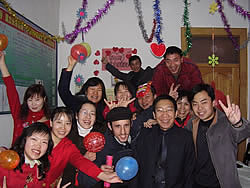 Chinese philosophy to development is usually to smash, burn and destroy everything old and rebuild again excessively brash, excessively wide and excessively superficial within no more than five years. The Chinese are a very practical people and I admire their determination to improve the nation but everyday I get the feeling that everything is being rushed and it’s an opinion I’ve heard reflected on a number of occasions by Chinese friends. In Kashgar, superficiality hasn’t quite managed to smother the wealth of local heritage. In China, ‘reconstruction’ usually begins along new roads ploughed through on a north south axis and later fills in the gaps. Yet in Kashgar, the Chinese seem to be content with keeping the redevelopment cycle to the blatantly Chinese part of the city and picking away at the surrounding buildings that give Kashgar its character, soul and a place in my heart. Dunhuang was slightly different. Development only arrived in town ten years ago with China’s famous Western expansion program but the city still had a feeling of the old about it. Whilst the town centre had been virtually rebuilt around a compass axis, the streets were narrower and people still loitered along them. Whilst the face of Dunhuang is changing quickly, its people aren’t and the place still had a small town mentality that I fell in love with almost instantly. The oasis is locked in by a prison of surrounding dunes and it would be uncommon not to walk down the street and say hi" to a dozen people. Yesterday’s PoliticsHowever what surprised me the most in Dunhuang, was the attitude of the town and the old demarcation of the Chinese empire. Not one Uighur graced her streets as I wandered around town during my initial first days and I saw very few over the following two months. Although I was technically in another province (Gansu), Xinjiang lay but a few hours away and I was surprised to see almost 100% Han Chinese crowding the streets. Many Dunhuang residents claim they still live on the ‘frontier’of China and that progress here was slow, making me wonder how they classified Xinjiang. Whereas Han Chinese lose few opportunities moving throughout greater China, can the same be said for her minorities? In Xinjiang, Uighurs still outnumber Han Chinese and whereas that cohesion may limit their impetus to move, there is an undeniable stigma against them in China proper and how welcome they are made to feel there is open to debate. Teaching TribulationAs I arrived in Dunhuang, so did Christmas and on the face of things, the festive season was everywhere. Pictures of Santas adorned shop fronts, Christmas music belched from occasional shops and the streets thronged with shoppers?except there was no spirit anywhere. Come Christmas day, the streets were still busy, school children continued to classes and the same grinning Santas only confirmed the season as a western marketing novelty to garner more custom. Could this be the way we are heading in the West? Two months teaching in Dunhuang skipped by in a heartbeat. My original placement had been arranged back in September last year and the plan had been to teach in a rural school outside Dunhuang where my time would have the most value. Yet I should have known that expectations should never be made to order and I quickly found that the local education board had other ideas. Being a foreigner in China, I was expected to deliver the best and want the best too and nothing would change that. I later learnt that there hadn’t been a foreign teacher in town in over twenty years and nobody was about to allow that opportunity to leave for some unnamed village, whatever benefit that may bring. Thus I committed myself to Dunhuang. For the first two weeks everything went well. Despite my nerves my class was great and were virtually all poor farmers children from surrounding villages. I threw myself into the job aiming, to improve their conversational and reading skills in the short time we had, yet the biggest difficulty was again keeping my own expectations to a realistic level. As in most of Asia, the Chinese education system places an emphasis on thinking for the student, rather than getting the students to think for themselves. Most mornings I was greeted with a sea of potatoes more used to being spoon fed the answer than thinking it up and most mornings I almost tore my hair out in frustration as I readapted to a job I hadn’t done for almost two years. An Unexpected Opportunity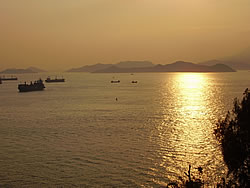 The year finally closed with an earthquake off the coast of Taiwan that severed all international communication with China and a bombshell from the education authority revoking my permission to teach in Dunhuang. Though 憄ermission?had been supposedly arranged in September ?6, the head of the authority hadn’t realized that permission was needed from the provincial capital 1200 kms away. In other words the man in charge, hadn’t done his homework or cared enough to try. The main excuse offered was that Dunhuang was on the frontier of China so they hadn’t known! Exams in mid-Jan obliterated any chance of teaching long into the New Year and the school had long planned to set me up teaching English to tour guides until March. With the cancelling of their course, several tour guides approached me and I agreed to take them for informal classes until Chinese New Year. Thus for the next six weeks, 12 tour guides and myself crammed into a room the size of cupboard for four hours of conversation, public speaking skills and vocabulary. I relished the challenge of engaging with equals with whom one could readily sit down and discuss the finer points of Chinese politics at anytime and I was surprised about how much of my own language’s grammar that I learnt. Every day, one member from the class taught me Chinese and I still had enough spare time to roam the surrounding countryside, visit local camel wallahs and plan the trip to come. Thus the benefits of teaching English to tour guides are: 1. An encyclopedic gathering of local experts who
can probably teach you just as much as you can them. The Year of the Pig (4705)Time flew by teaching in Dunhuang. Not only did I learn a lot about myself from the challenge but I gained an invaluable insight into China’s history and into the Chinese mind itself that no amount of time living in Xinjiang had ever revealed. More than ever I review Xinjiang as a part of China, but as distinct as England from Uruguay, (if not more). There may be similarities but for me the difference is this; I could travel in China but I could live in Xinjiang. The 4705th Chinese New Year takes took place on the 18th February 2007. Although we finished class on Valentines Day, about a third of my students disappeared almost a week before to go please the kitchen god, make ready their homes and food or travel out of Dunhuang to visit relatives. 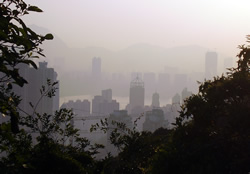 Spring Festival (Chinese New Year) is the biggest event in the Chinese cultural calendar and the biggest mass human migration on the planet. In 2007 X billion people traveled around the world to visit friends and family in readiness for the first day of the celebration. The festival traditionally lasts for 15 days but only seven are now observed in an ever advancing China, yet just like our Christmas the whole face of the country changed. In Dunhuang, firecrackers and fireworks appeared by the bucketful on street corners and vendors were doing a roaring trade well over two weeks before eve. New Year’s markets selling red couplets and auspicious signs appeared around town and as the sun set on New Years Eve the streets thronged with anxious buyers and an exorbitant amount of the colour red. Thousands of years ago a ferocious beast called a Nian terrified the residents of a village in China, devouring them and wreaking havoc on their lives at the start of every 12 months. An immortal visited the village and advised the residents to smother the village with red decorations and fill bamboo shoots with gun powder. When the evil Nian returned to the villages, the residents lit the gunpowder and made such a display that the Nian fled faraway and never returned again. At midnight on the 18th February all manner of explosions ripped across Dunhuang as her residents set off millions of fire-crackers to see off the last year and keep evil spirits out of the next. Doors unbolted and hinges creaked as thousand of residents scurried out of their homes onto the streets and back alleys of Dunhuang to light reams of Chinese crackers, leaving doors and windows open to allow the old year to pass out and welcome in the new. ‘Nian’in Mandarin Chinese means year and the first day of the New Year is traditionally one for greeting distant family and relations. Red packets with money are given to children and dumplings (jiaozi) are eaten by the plateful. Symbols are hugely important during this time, odd numbers are considered unlucky and the number four is associated with death. Fish is linked with surplus or extra and the Chinese symbol for it is often displayed. No one ever said China was an easy culture to understand! Fellowship of the Royal Geographic SocietyIn mid-February, I was nominated to become a fellow of the prestigious Royal Geographic Society in London, UK. CuChullaine O扲eilly of the Long Riders Guild, a fellow himself, put forward my name and I was approved soon after. This is not only an honour but a privilege and responsibility and my humble thanks goes to CuChullaine and the RGS. Hong Kong or BustWith a little tour guide help, I managed to reach Hong Kong without difficulty. Although it was the middle of February the temperature rapidly turned from desert cold to tropic warm as the train plummeted south towards Guangzhou. Crossing into the former colony was a simple matter of boarding a bus in Guangzhou on the Chinese side and sitting put for three hours whilst we idled across the border. Customs offered few checks. The city hadn’t changed much since my last visit there in 2002 but my perceptions certainly had. Last time my eyes took in the terrifying expanse of ethereal skyscrapers, the Indian ghetto of Chungking and the tourist markets of Kowloon. This time I saw the people, the competition, the hive-drone mentality, the language and the imperfect cracks in a perfect place. Memoirs of the Present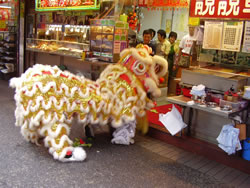 I hadn’t intended to spend three months in Hong Kong, and it was mainly by accident that I did. On my first day, I relished the freedom of being able to buy good milk, read an English newspaper and eat crisp sandwiches on a bus stop! I caught an orderly bus to a Youth hostel on an old World War 2 battlement and relived a polar life to that of China only three hours away. My first impressions of the city were of all the small things I抎 forgotten about England, represented on an island over 10,000kms away; double yellow lines, bright red fire hydrants, beat up old trams, pelican crossings, milk and crisp sandwiches, rugby sevens, a penchant for queuing and one huge glaring difference - the chance to speak English. The city fills the heart with many joys but number one is the chance to speak English. Nothing can express the joys of being able to speak, read and think in English with other people after a year in China. It’s no lie when I say that I got more things done in one day in Hong Kong than in a week in China. The Issue with ConformityHong Kong has many quirks; Filipino guest-workers on Sundays, bamboo scaffolding building some of the worlds highest skyscrapers and brothels cum bars in Wanchai. And yet, it was the amalgamation of it all that intrigued me the most; the world class business centre, the 14 million tourists every year, the rickety trams that trundled down Hong Kong Island, the amazingly efficient MTR metro. One of the things that I noticed immediately on entering Hong Kong was the huge difference between Cantonese (the local language) and the Mandarin Chinese spoken by the majority of the Chinese population. I realized in fact that my previous perception of China had come out of Hong Kong, yet the two languages are poles apart and the attitudes of both people are very different. Ghosts of the PastMy time in Hong Kong began easily. I knew what I had to do and Hong Kong made sure they got done. As a British National I had no worries about spending time in Hong Kong but I needed a one year visa for China that was only available here. That took only a day to arrange and over the next week I scoured the city for the remaining pieces of equipment I needed. Yet while Hong Kong proved a shopper’s paradise for outdoor goods, key pieces such as satellite phones, solar panels and cooking sets were elusive and the only option was to order online. Time is no man’s friend. Decisions are often easy to talk about but difficult to make and I spent the following weeks hung over mine. My insulated life in Dunhuang was over, and tough decisions had to made on the ride’s future and how to conduct it. This ride has always been self-funded and getting this far has taken deep pockets, loyal sponsors and amazing parents and the choice to continue the ride’s documentary was extremely difficult to make. This time there would be no film crew from India or Pakistan, no partner to share the costs, no shoulder to lean on in the middle of the Gobi desert. This time it would be only me and I had to be sure I could deal with that. Facing the truth and banning deception is one of the hardest things a man can do. No sympathy awaits a man in the central Gobi desert, there’s no shoulder to cry on for he who slips up, no lifeline to rescue you. Every journey must have an end and I realized that after Hong Kong mine would be a camel length away and as time drew to a close, each day became a daily battle to reach finality on an ideal I抎 set myself. Each day was a small step forward, another base covered amidst a sea of endless opportunities. There’s no medal at the end of this journey, no pat the back or a well done to you. Something greater awaits - self-respect. The knowledge that my heart prevailed in its eternal battle with the doubt of the mind. The knowledge that I did my best whatever the outcome. The knowledge that in my short life, I did something worthwhile at least once and I can’t ask for more. Life moves forward not backwards. We can’t sit on the fence forever. The Promise of the Future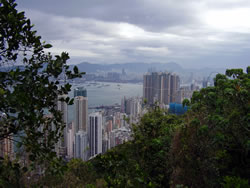 Hong Kong is still one of the busiest ports in the world, with unimaginable wealth tied up amongst a rough and tumble of skyscrapers competing for space on a stamp size area of China. It’s one of the most densely populated places on the planet, has one of the longest life spans (average 80) and is the world’s eighth largest trading economy. If I couldn’t get my ride organised in Hong Kong, then no where would do and after three months of work all proved true. Over the three months, equipment flooded into Mt. Davis Youth Hostel and my deep appreciation goes to a supportive staff. Hong Kong is a duty free port and the ideal place to import directly into China, especially video cameras. In our crazy world, every thing has an opposite and every problem has a solution. Hong Kong International Film school provided advice and training and on May 24th Maria Lagarde flew in from Malaysia to film the start of the ride. Sponsors both new and old proved their support to R4E and the ride can proudly welcome, McNett, Loco Engineering, Nomads Travel, Global Solar and MailaSail onboard the project. Graphic design for the journey was provided courtesy of Ichi Design and Translation and a big shout out must go to Stratos Global who provided the ride with a working satellite phone after we discovered at the last moment that the data connection on my old one didn’t work. The ride now has 18 regular sponsors, the trappings of a fantastic documentary, marketing, a full equipment roster and the driver and support to this ride through. BBC Manchester has agreed to host a weekly blog on the journey to come and now all that remains is to buy the camels… |
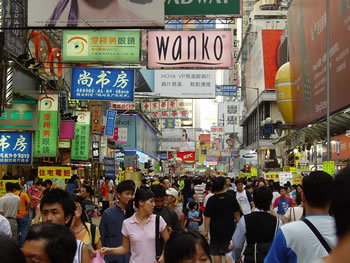 Hopes, dreams and a whiff of adventure carried me to Dunhuang for a
winter sojourn before I considered continuing my journey in spring. The train
journey from Kashgar was cold and was only memorable for existing in double
digits for far too long. For 37 hours our train chugged to Turpan from where I
took a bus across twelve hours of desert out of Xinjiang and Central Asia into
China proper.
Hopes, dreams and a whiff of adventure carried me to Dunhuang for a
winter sojourn before I considered continuing my journey in spring. The train
journey from Kashgar was cold and was only memorable for existing in double
digits for far too long. For 37 hours our train chugged to Turpan from where I
took a bus across twelve hours of desert out of Xinjiang and Central Asia into
China proper.